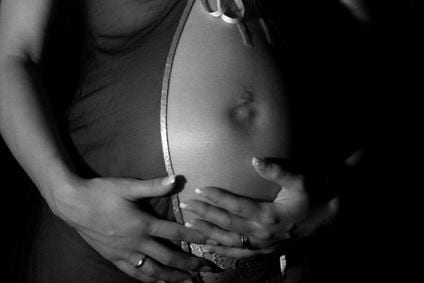Abdominal pain can be a normal part of pregnancy as well as the labor process, according to the March of Dimes. However, severe abdominal pain or pain accompanied by other symptoms, such as severe bleeding, could be a sign of pregnancy complications, ranging from miscarriage to potentially life-threatening tubal pregnancies. Learning more about the types and features of ordinary versus extraordinary pregnancy abdominal pain can help you identify any potential problems early in the event of the unexpected.
Warnings
If your abdominal pain is accompanied by clot-like bleeding from your vagina, this may indicate a potential miscarriage, according to the March of Dimes. If your symptoms are accompanied by dizziness, fainting or chills, this could indicate a potential medical emergency. You should immediately call your doctor or the local rescue squad.
Typical Features
Mild to moderate abdominal pain during pregnancy is usually not something to become overly concerned with, according to the March of Dimes. Some women experience period-like cramps during the early weeks of pregnancy. As your pregnancy progresses and your uterus and surrounding ligaments stretch, you may sometimes feel a sharp pain on one side or a sharp pain across your belly.
Identification of Serious Causes
Severe abdominal pain or aches that worsen could indicate an ectopic pregnancy, according to the March of Dimes. This is most common during the first three months, or first trimester, of pregnancy and indicates that the fetus is lodged in a fallopian tube and not the uterus. Such pregnancies cannot be safely converted to traditional methods and must be medically terminated. Failure to identify promptly an ectopic pregnancy can lead to potentially fatal bleeding or loss of fertility.
Prevention and Treatment
While not every incidence of pregnancy-related abdominal pain can be prevented, some expectant moms can reduce their chances of stomach aches or relieve such problems once they begin, according to the March of Dimes. If you feel abdominal pain, bend toward that area to try to alleviate the discomfort. Likewise, changing position, walking or engaging in mild activity, such as light housecleaning, may stop gas-related abdominal pains.
Labor Identification
Near the end of your pregnancy, abdominal pain may well indicate impending labor, according to the March of Dimes. When contractions begin and are about five to 10 minutes apart, your future son or daughter is well on the way out of your womb and into the outside world. You also will not be able to walk or talk easily during the abdominal pains that lead to labor. Keep in mind that premature labor is possible. With medical advances, however, many premature babies grow up into healthy children.
Photo Credit
- she have a baby s/w image by Patrizier-Design from Fotolia.com





